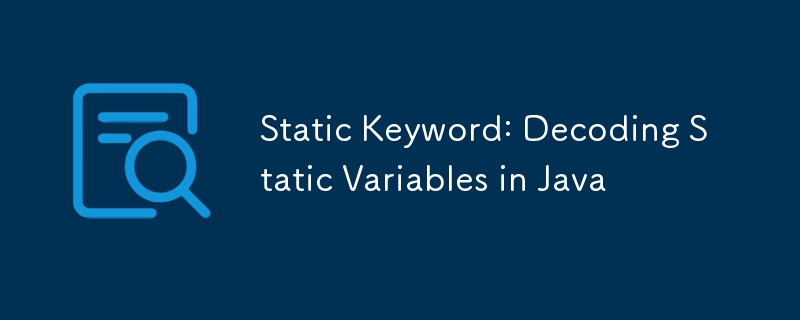Heim >Java >javaLernprogramm >Statisches Schlüsselwort: Dekodierung statischer Variablen in Java
Statisches Schlüsselwort: Dekodierung statischer Variablen in Java
- Susan SarandonOriginal
- 2024-10-21 20:12:021128Durchsuche

Willkommen zurück zur Java Keywords Essentials-Reihe! In diesem Beitrag dreht sich alles um statische Variablen – eine leistungsstarke Funktion in Java, die es Ihnen ermöglicht, Daten über mehrere Objekte derselben Klasse hinweg zu teilen.
Wir gehen durch den Zweck, das Verhalten und die wichtigsten Anwendungsfälle statischer Variablen, mit praktischen Beispielen und Erkenntnissen. In einem separaten Beitrag gehen wir auf statische Methoden ein, um Sie nicht mit zu viel Inhalt zu überfordern.
Dieser Beitrag baut auf Konzepten auf, die in früheren Beiträgen besprochen wurden. Ich empfehle die Lektüre von Final Keyword und Static Blocks, um ein tieferes Verständnis der hier behandelten Themen zu erlangen.
Was sind statische Variablen?
Eine statische Variable gehört zur Klasse und nicht zu einer einzelnen Instanz. Es wird von allen Objekten der Klasse gemeinsam genutzt und behält für alle Objekte den gleichen Wert.
Hauptmerkmale
- Variable auf Klassenebene: Von allen Instanzen der Klasse gemeinsam genutzt.
- Einmal initialisiert: Wenn die Klasse von der JVM geladen wird.
- Speicherort: Gespeichert im Methodenbereich.
- Zugriff: Der Zugriff kann sowohl über den Klassennamen als auch über Objektreferenzen erfolgen (obwohl der Klassenname bevorzugt wird).
Codebeispiel: Statische Variablen in Aktion
package keywords.static_keyword;
public class StaticVariables {
// Static variable: Shared across all instances of the class
// Automatically initialized to default value on class loading
static int idCounter; // int default value -> 0
// Static final variables
// Must be initialized at declaration or in a static block
static final String COMPANY_NAME = "TechCorp";
static final String OFFICE_CODE;
// Instance variables: Unique to each object
int employeeId;
String employeeName;
// Static final variable Initialized in a static block
static {
// Default region: US
String region = System.getProperty("user.region", "US");
switch (region) {
case "EU":
regionalOfficeCode = "EU-01";
break;
case "APAC":
regionalOfficeCode = "AP-11";
break;
default:
regionalOfficeCode = "US-00";
}
System.out.println("Static Block Invoked: Office Code set to " +
regionalOfficeCode);
}
// Constructor: Assigns a unique ID to each object
public StaticVariables(String name) {
this.employeeName = name;
this.employeeId = ++idCounter; // Incrementing the shared counter
}
// Instance method
// Displays instance details along with shared data(static variables)
void displayEmployeeDetails() {
System.out.println("Employee ID: " + employeeId +
", Name: " + employeeName +
", Company: " + COMPANY_NAME +
", Office Code: " + OFFICE_CODE);
}
public static void main(String[] args) {
// Creating instances to observe static variable behavior
StaticVariables emp1 = new StaticVariables("Alice");
StaticVariables emp2 = new StaticVariables("Bob");
emp1.displayEmployeeDetails();
emp2.displayEmployeeDetails();
// Accessing the static variable directly using the class name
System.out.println("Total Employees: " + StaticVariables.idCounter);
}
}
Erläuterung des Kodex
Ausgabe:
Static Block Invoked: Office Code set to US-00 Employee ID: 1, Name: Alice, Company: TechCorp, Office Code: US-00 Employee ID: 2, Name: Bob, Company: TechCorp, Office Code: US-00 Total Employees: 2
Demonstrierte Schlüsselkonzepte:
-
Statische Variablen:
- Wird von allen Instanzen geteilt und behält seinen Wert zwischen den Instanzen bei.
- Beispiel: idCounter verfolgt, wie viele Mitarbeiter erstellt wurden.
-
Statische Endvariablen:
- Konstanten, deren Werte einmal zugewiesen werden und sich nie ändern.
- Beispiel: COMPANY_NAME und OFFICE_CODE.
-
Statischer Block:
- Wird einmal ausgeführt, wenn die Klasse geladen wird.
- Wird verwendet, um komplexe statische Variablen wie OFFICE_CODE basierend auf Umgebungskonfigurationen zu initialisieren.
-
Instanzvariablen und -methoden:
- Jede Instanz verfügt über eindeutige Werte für „employeeId“ und „employeeName“.
-
Zugriff auf statische Variablen auf Klassenebene:
- Auf den idCounter wird über den Klassennamen zugegriffen:
package keywords.static_keyword; public class StaticVariables { // Static variable: Shared across all instances of the class // Automatically initialized to default value on class loading static int idCounter; // int default value -> 0 // Static final variables // Must be initialized at declaration or in a static block static final String COMPANY_NAME = "TechCorp"; static final String OFFICE_CODE; // Instance variables: Unique to each object int employeeId; String employeeName; // Static final variable Initialized in a static block static { // Default region: US String region = System.getProperty("user.region", "US"); switch (region) { case "EU": regionalOfficeCode = "EU-01"; break; case "APAC": regionalOfficeCode = "AP-11"; break; default: regionalOfficeCode = "US-00"; } System.out.println("Static Block Invoked: Office Code set to " + regionalOfficeCode); } // Constructor: Assigns a unique ID to each object public StaticVariables(String name) { this.employeeName = name; this.employeeId = ++idCounter; // Incrementing the shared counter } // Instance method // Displays instance details along with shared data(static variables) void displayEmployeeDetails() { System.out.println("Employee ID: " + employeeId + ", Name: " + employeeName + ", Company: " + COMPANY_NAME + ", Office Code: " + OFFICE_CODE); } public static void main(String[] args) { // Creating instances to observe static variable behavior StaticVariables emp1 = new StaticVariables("Alice"); StaticVariables emp2 = new StaticVariables("Bob"); emp1.displayEmployeeDetails(); emp2.displayEmployeeDetails(); // Accessing the static variable directly using the class name System.out.println("Total Employees: " + StaticVariables.idCounter); } }
Wann werden statische Variablen verwendet?
- Globale Zähler: Nützlich für die Verfolgung allgemeiner Zustände, z. B. ID-Generatoren oder Zähler.
- Konfigurationseinstellungen: Speichern Sie Werte, die konstant bleiben, wie z. B. Konfigurationen auf Anwendungsebene.
- Caching: Verwenden Sie statische Variablen, um häufig verwendete Daten zwischenzuspeichern (achten Sie dabei auf eine ordnungsgemäße Speicherverwaltung).
Fazit
In diesem Beitrag haben wir statische Variablen untersucht – eine grundlegende Funktion, die einen gemeinsamen Status über Instanzen hinweg ermöglicht. Das Verständnis statischer Variablen hilft dabei, effizienteren Code zu schreiben, insbesondere bei der Verwaltung von Daten, die über mehrere Objekte hinweg konsistent bleiben müssen.
Im nächsten Beitrag werden wir uns eingehend mit statischen Methoden befassen und deren Verhalten, Einschränkungen und Best Practices untersuchen.
Verwandte Beiträge
Java-Grundlagen
Array Interview Essentials
Java Memory Essentials
Collections Framework Essentials
Viel Spaß beim Codieren!
Das obige ist der detaillierte Inhalt vonStatisches Schlüsselwort: Dekodierung statischer Variablen in Java. Für weitere Informationen folgen Sie bitte anderen verwandten Artikeln auf der PHP chinesischen Website!

